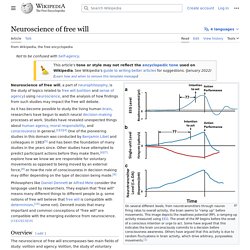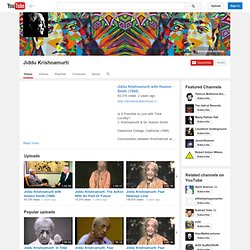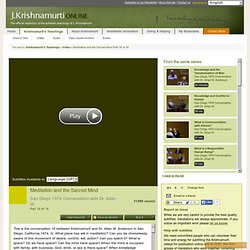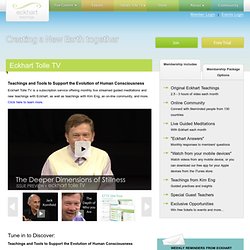

Philosophy since the Enlightenment, by Roger Jones. Philosophy. Philosophy is the study of general and fundamental problems, such as those connected with reality, existence, knowledge, values, reason, mind, and language.[1][2] Philosophy is distinguished from other ways of addressing such problems by its critical, generally systematic approach and its reliance on rational argument.[3] In more casual speech, by extension, "philosophy" can refer to "the most basic beliefs, concepts, and attitudes of an individual or group".[4] The word "philosophy" comes from the Ancient Greek φιλοσοφία (philosophia), which literally means "love of wisdom".[5][6][7] The introduction of the terms "philosopher" and "philosophy" has been ascribed to the Greek thinker Pythagoras.[8] Areas of inquiry Philosophy is divided into many sub-fields.

Neuroscience of free will. Neuroscience of free will is the part of neurophilosophy that studies the interconnections between free will and neuroscience.

As it has become possible to study the living brain, researchers have begun to watch decision making processes at work. Findings could carry implications for our sense of agency and for moral responsibility and the role of consciousness in general.[1][2][3] Relevant findings include the pioneering study by Benjamin Libet and its subsequent redesigns; these studies were able to detect activity related to a decision to move, and the activity appears to begin briefly before people become conscious of it.[4] Other studies try to predict activity before overt action occurs.[5] Taken together, these various findings show that at least some actions - like moving a finger - are initiated unconsciously at first, and enter consciousness afterward.[6] A monk meditates. Overview[edit] -Patrick Haggard[6] discussing an in-depth experiment by Itzhak Fried[13] Criticisms[edit] On Truth & Reality: Philosophy Physics Metaphysics of Space, Wave Structure of Matter. Famous Science Art Quotes.
KrishnamurtiArchive. Is it Possible to Live with Total Lucidity?

J. Krishnamurti & Dr. Huston Smith Claremont College, California (1968) Conversation between Krishnamurti and Prof. Show less. Jiddu Krishnamurti. Jiddu Krishnamurti Can Another Dispel the Darkness in Oneself. The Teachings of Jiddu Krishnamurti. Jiddu Krishnamurti: Fear Destroys Love. Jiddu Krishnamurti: Meditation (Part 1) Jiddu Krishnamurti: Meditation (Part 2) Meditation and the Sacred Mind. This is the conversation 18 between Krishnamurti and Dr.

Allan W. Anderson in San Diego, California,1974. Q: What place has will in meditation? Can you be choicelessly aware of this movement of desire, control, will, action? Can you watch it? Save as favorite J. Eighteenth Dialogue with Dr Allan W. February 1974 J. This is one of a series of dialogues between Krishnamurti and Dr. A: Mr Krishnamurti, we were discussing in our conversation last time meditation. K: Yes. A: Though in ordinary language we make the distinction perhaps unwittingly.
K: It's there. A: We have the two words. K: Quite. A: But then to go into what the distinction is was something you were beginning to do. K: We could on from there. A: Yes. Video. Have you ever sat very silently, not with your attention fixed on anything, not making an effort to concentrate, but with the mind very quiet, really How do you listen?

The Movement of Meditation. So we are asking, whether a brain, which is your brain, which is the brain of all human beings evolved through immemorial time, conditioned by cultures, religions, by economic, social pressures, that brain has had a timeless continuity till now, and in that duration it has found a sense of being safe.

That is why you accept tradition. Because in tradition there is safety, in imitation there is safety, in conformity there is safety, and there is also safety in an illusion. Obviously. All your gods are illusions obviously, put up by thought. So there is not only the obvious continuity, in which the brain seeks safety, but also it finds safety in all kinds of illusory activities in our daily life. Save as favorite J. Sixth Public Talk in Madras January 1979 I forgot. I would like if I may to talk over a great many things this afternoon, and if we can together go into something very simple, but very, very complex.
Jiddu Krishnamurti: The Art Of Listening. Bhagavan Sri Ramana Maharshi ◦ The Sage of Arunachula. Zen: The Best of Alan Watts. A person who thinks all the time has nothing to think about except faults, so he loses touch with reality and lives in a world of illusions. By thought I mean the chattering inside the skull; perpetual and compulsive repetition of words, of calculations, and symbols going on inside the head. For as a result of confusing the real world of nature with mere signs, such as money, stocks and bonds, title deeds, and so forth. This is a disaster. Time to wake up. Alan Watts - fear of enlightenment. TV - Home. Teachings and Tools to Support the Evolution of Human Consciousness Eckhart Tolle TV is a subscription service offering monthly live streamed guided meditations and new teachings with Eckhart, as well as teachings with Kim Eng, an on-line community, and more.

Click here to learn more. Tune in to Discover: Teachings and Tools to Support the Evolution of Human Consciousness Simple practices for inner peace How to bring presence into everyday life Wisdom to transform your relationships How to find your purpose in life How to balance "doing" and "being" Insights for working with ego This week's present moment reminder from Eckhart “When you lose touch with inner stillness, you lose touch with yourself. Browse: CD 1 Part 1 of 5 - Practicing the Power of NOW - Eckhart Tolle. Living Luminaries Eckhart Tolle.